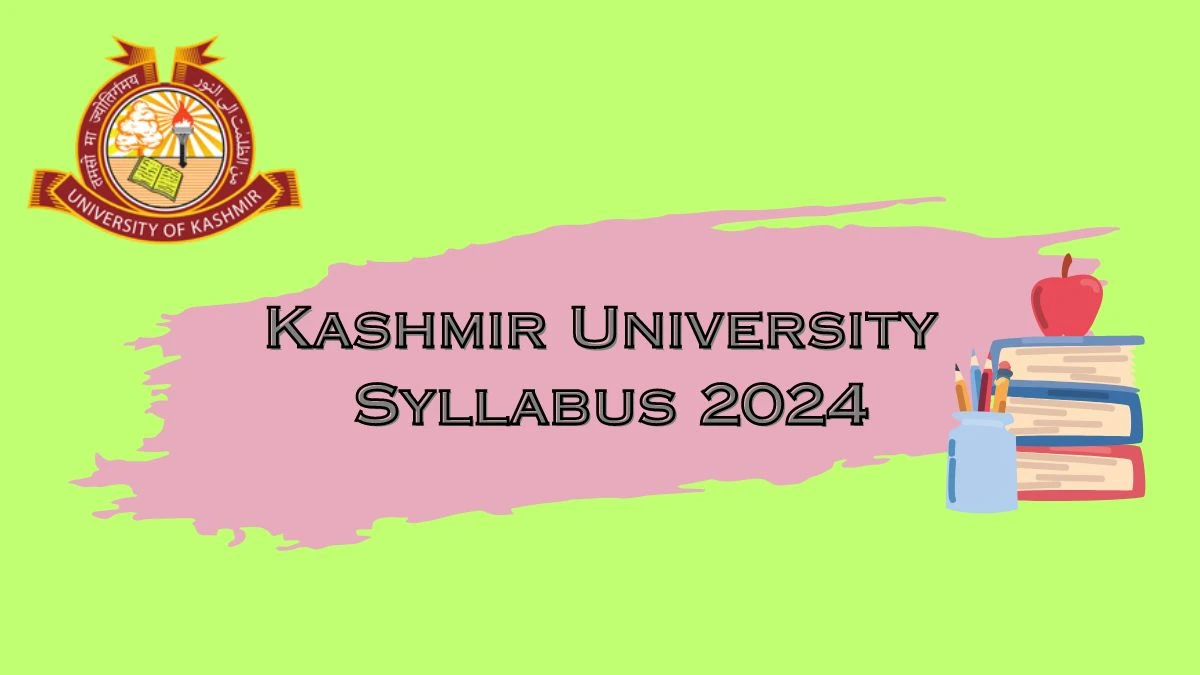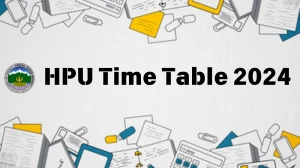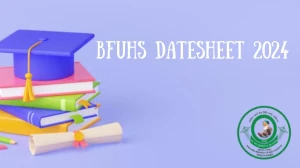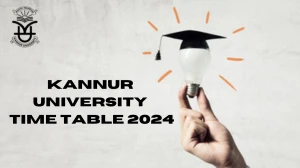- Rojgarlive »
- Education »
- Kashmir University Syllabus 2024 @ kashmiruniversity.net Check Syllabus, Exam Pattern Details Here
Kashmir University Syllabus 2024 @ kashmiruniversity.net Check Syllabus, Exam Pattern Details Here
by Keerthika
Updated May 10, 2024

Kashmir University Syllabus 2024 @ kashmiruniversity.net
The Kashmir University has made the Kashmir University 2024 syllabus available online, accessible through its official website and official brochure. Recognizing its significance, aspirants should note that the Kashmir University syllabus 2024 greatly aids in preparing for the University of Kashmir entrance exam. The Kashmir University syllabus download link can be found on the official website. Candidates are advised to thoroughly review the entire Kashmir University UG syllabus PDF and create a timetable that allows them to cover the Kashmir University syllabus 2024 adequately while still allocating time for revisions. It is recommended that candidates carefully review the Kashmir University syllabus before devising any exam preparation strategies. For further details on the Kashmir University syllabus, refer to the complete article.
Check - Kashmir University Syllabus 2024
Download Here - Kashmir University Syllabus 2024
How to Download Kashmir University Exam Syllabus?
- Go to the Kashmir University website.
- Scroll to the bottom of the home page to find the "Quick links".
- Select the "Syllabus" option.
- The course-wise syllabus for KU will be displayed.
- The University of Kashmir syllabus is available in PDF format for printing if needed.
Entrance Test Syllabus-2024
MSc. Environmental Science School of Earth and Environmental Sciences University of Kashmir Srinagar
The question paper containing 60 multiple answer type questions for the entrance examination for admission to M. Sc. Environmental Science will be broadly based on the below mentioned topics placed under 15 units drawn from different branches of science strongly related to the Environment. The paper will be spread over the whole syllabus, with four questions from each unit and each carrying one mark.
Unit 1: Components of Environment
Importance, structure and composition of Atmosphere, Hydrosphere and Hydrological
Cycle, Origin of Earth, Origin and evolution of life, Lithosphere: Structure and
composition, Biosphere Cryosphere and Anthrosphere
Unit 2: Ecology and Ecosystem
Concept and Structure and function of an ecosystem, Food chain, Food web, Pyramids,
Ecosystem services and Ecological balance in nature, Energy flow, Ecosystem
productivity, Succession (Hydro sere and Xerosere), Zoo-geographical distribution of
important flora and fauna
Unit 3: Environmental Chemistry
Titrimetry, Volumetry, Colorimetry, Mole concept, molarity, normality, quantitative
volumetric analysis, Concept of Acids and Bases, Buffer system, Thermochemical and
photochemical reactions in atmosphere, Chemistry of greenhouse gases, Physicochemical properties of water, Biological oxygen demand and Chemical oxygen demand,
Inorganic and organic components of soil, soil profile
Unit 4: Environmental Geosciences
Geological time scale, Continental drift and plate tectonic, Types of rocks and rock cycle,
Internal and external earth surface processes, Weathering Process, Disaster management
framework, Disaster risk and vulnerability, Physiography and river systems of India with
special reference to J&K
Unit 5: Human, Environment, Man-wildlife conflict
Environmental ethics, Anthropocentrism, Biocentrism, Ecocentrism, Technocentrism,
Ecofeminism, Deep and shallow ecology, Land ethic, Gaia hypothesis, Impact of conflict
on humans and wildlife, Impact of habitat fragmentation, social inequality in terms of
forest conservation, Bishnoi movement, Chipko movement, Appiko movement, Narmada
Bachao Andolan, Tehri dam conflict
2
Unit 6: Air and Noise Pollution
Ambient air quality: monitoring and standards, Types and sources of air pollution, Air
quality index, Effects of air pollutants on environment and health, Indoor air pollution,
Control of air pollution, Ambient noise quality and standards, Sources, Effects and
Control of noise pollution
Unit 7: Water and Soil pollution
Water pollution: causes, impacts and prevention/control measures, Eutrophication,
Thermal pollution, Acid precipitation, Soil pollution, causes, effects and control
measures, Solid waste: Municipal and industrial wastes
Unit 8: Natural Resources and Management
Land resources: Global land use patterns, concept of waste land reclamation and
desertification, Forest resources: Use and consequences of over-exploitation, Forest
types in India, Water resources: Use and consequences of over-utilization, concept of
water harvesting and watershed management, Mineral Resources: distribution in India
and J&K, Food resources: World food problems and concept of sustainable agriculture
Unit 9: Biodiversity and Conservation
Biodiversity: meaning, levels and values (commercial, ecological, social and aesthetic),
Measures of diversity : alpha, beta, gamma, richness and evenness, Threats to
biodiversity, Hot Spots and cold spots, Concept of endemic and exotic species, In-situ
conservation: National parks, sanctuaries, biosphere reserves, ramsar sites, Ex-situ
conservation: botanical gardens, zoological parks, zoos, seed banks, in-vitro
conservation, pollen culture, tissue culture and DNA banks, IUCN Red List categorization
– guidelines, practice and application; Red Data book
Unit 10: Green Technology
Definition and concepts: green technology, 3 R’s of green technology: recycle, renew and
reduce, Green buildings; history of green buildings, need and relevance of green
buildings over conventional buildings; LEED certified building, Eco-mark certification,
establishment of Eco-mark in India, its importance and implementation, Carbon capture
and storage (CCS) technologies, Life cycle assessment(LCA), Compact florescent
light(CFL) and cogeneration
Unit 11: Solid waste management and Vermicomposting
Sources and generation of solid waste, Composition and characteristics of solid waste,
Biomedical and hazardous waste, Effects of solid waste on environment, Management of
solid waste, Resource recovery, composting and waste to energy, Importance of
Vermicompost in Agri-horticultural practices, Vermicomposting for Organic Farming,
Vermicomposting techniques, standard composition of vermicompost, Earthworms:
Type, identification & usefulness
3
Unit 12: Energy, Environment and sustainable Development
Renewable energy resources: Solar energy, Wind energy, Tidal energy, Geothermal
energy, Nuclear energy, Biomass energy, Non-renewable energy resources: Fossil fuels
(coal, petroleum, Natural Gas), Concept of Sustainable development, Brundtland
commission report, Sustainable development Goals (SDG’s)
Unit 13: Environmental Issues and Challenges
Acid rain, Smog and Ozone depletion, Climate change: causes and consequences, Human
population growth and environment, Water-borne diseases: Cholera, Typhoid, Hepatitis,
Natural disasters and environmental challenges: Floods, Earthquakes, Landslides,
Pandemics, Food and water security
Unit 14: Environmental Education and Environment and Society
Environmental education-goals, objectives and need for public awareness, role of
women in environmental education, awareness and sustainable development, Role of
NGO’s and mass media, environmental organizations and governments in
environmental education
Unit 15: Environmental legislation and Policy
International initiatives: Stockholm, Earth summit, Montreal and Kyoto protocol, Wildlife
protection Act-1972, Water Act-1974, Air Act-1981, Environment protection act- 1986,
Forest conservation Act-1980, Noise pollution Rules-2000, Constitutional provisions:
Article 21, 48A, 51A, Principle of no fault, Polluter pay principle.
Kashmir University Syllabus 2024? -FAQ
With Kashmir University sample papers, candidates are not required to go through textbooks to practise questions. After completing the entire syllabus, candidates can check their knowledge and evaluate themselves by practising more and more Kashmir University sample papers
You can download the Kashmir University 2024 syllabus at the official website of the university.




